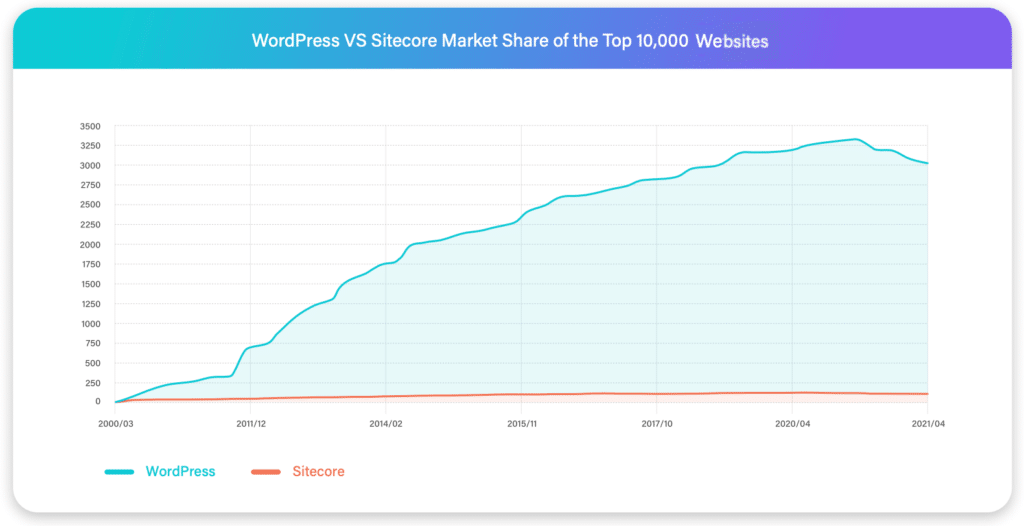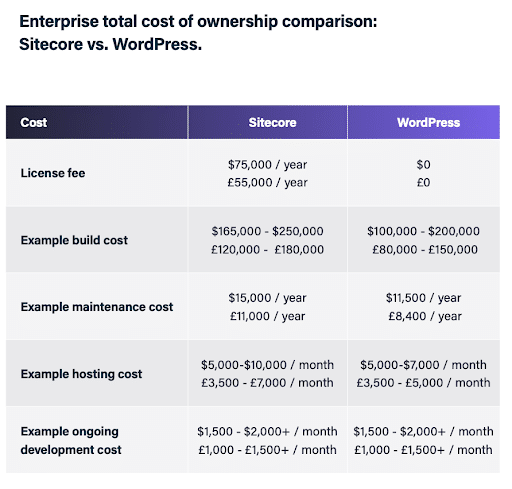WordPress vs. Sitecore: Which CMS Is Right for You?
There are plenty of options to choose from when you’re evaluating a content management system (CMS). The CMS marketplace has shown tremendous growth in recent years, and sifting through all of the different choices isa time-consuming endeavor.
To help you narrow your search, this guide will help you evaluate the differences between Sitecore, a popular, proprietary CMS, and WordPress, the #1 CMS in the world.
WordPress is an open source framework that now powers more than 40% of the top 1 million websites by traffic. This guide illustrates why its use has become so widespread, and its pros and cons compared to Sitecore.
Read the full report to find out how Sitecore stacks up next to WordPress, or keep reading for an overview of the ebook.
Download the ebook now to read the full report!
WordPress vs. Sitecore: An Overview
WordPress is the world’s most popular CMS, powering a huge share of the web today. WordPress.org, the open source version of the popular CMS, offers cost savings when compared to proprietary content management systems. WordPress is also highly flexible, serving as the foundation for everything from blogs and brand websites to eCommerce stores and more.
Sitecore also enjoys mainstream popularity, although its market share is much smaller than that of WordPress. Looking at the world’s top 10,000 websites by traffic, WordPress makes up nearly 35% of the market share while Sitecore accounts for less than 2%.

Initially launched in 2001, Sitecore was one of the earliest content management software products available. It remains the legacy CMS for a number of large, enterprise organizations today.
Sitecore and WordPress are both highly customizable, but one of the biggest differences between the two goes back to the open vs. closed debate: Sitecore is a proprietary CMS with a restricted code base while WordPress is built with open source code.
Proprietary vs. Open: Sitecore vs WordPress Comparison
Sitecore offers various levels of functionality for creating compelling digital content, but being proprietary means it comes at a higher cost—namely, expensive licensing fees that are required just to get up and running. And because Sitecore is a specific vendor with locked-down code, even license holders are unable to freely develop and adapt its core software.
WordPress, on the other hand, is free from upfront licensing fees and users can develop their WordPress sites any way they see fit, benefitting from a wide, open source ecosystem of integrations for added flexibility and customization.
Even more importantly, open source means WordPress is transferable—you’re not locked-in with a particular provider as you grow and develop your site, and because there’s a vibrant community of WordPress developers all around the world, WordPress experts are widely available for full-time or freelance hire.
You get to choose the features and functionality that are right for your digital requirements, as well as your web host.
While proprietary solutions offer various levels of out-of-the-box functionality, the nature of closed software is that it’s restrictive to a single platform, and it makes adding custom functionality or moving to a new provider a potentially labor-intensive, high-cost endeavor.
For businesses considering migrating from Sitecore to WordPress, working with a specialist agency such as Illustrate Digital minimizes those high-cost, labor-intensive risks by focusing on business objectives from the beginning of the discovery process to understand the underlying reasons for a migration.
Migrating from any CMS will always require a well-thought-out and properly planned migration strategy, and Sitecore is no exception, but with the right team guiding your website from one CMS to another, you can build a successful plan that includes the redesign and restructuring of any content.
As detailed in the full report, Sitecore meets the digital marketing and website needs for many enterprise-level businesses, but it pales in comparison to WordPress when it comes to ease-of-use, flexibility, agility, and total cost of ownership.
WordPress vs. Sitecore FAQs
Comparing Sitecore and WordPress: Which CMS Offers Greater Customization?
Sitecore remains a popular choice at the enterprise level where content management is usually less about ease of setup and more about capabilities for deeper personalization and customization.
However, unlocking Sitecore’s functionality is not as straightforward as some users might like. The complex development cycles typically associated with this CMS are not conducive to market agility and often represent a slower time to market.
This isn’t to say that deeper personalization and customization isn’t possible with WordPress—it can in fact rival Sitecore when it’s put to effective use. A WordPress specialist agency that is well-versed in UX, such as Illustrate Digital, can elevate far beyond WordPress’ built-in functionality, and combined with WP Engine’s enterprise hosting for WordPress, even the largest digital footprints can realize greater agility and cost savings.
Comparing Sitecore and WordPress: Which CMS Offers a Lower Ownership Cost?
Because WordPress is free from upfront licensing fees and connected to an engaged community of developers and engineers, users benefit from a wide, open source ecosystem of integrations for added flexibility and customization at a lower cost than Sitecore.
While Sitecore can meet the digital marketing and website needs for many enterprise-level businesses, it pales in comparison to WordPress with regard to ease-of-use, flexibility, agility, and total cost of ownership. See the chart below for more:

Comparing Sitecore and WordPress: Which CMS makes the most sense for a large, enterprise-scale business?
Overall, WordPress will almost always provide greater value and better Return on Investment (ROI) for small or medium-sized businesses.
As it’s evolved over the years, WordPress is also now highly capable of accommodating enterprise-level sites, as well as the needed scale and functionality that comes with them.
If you’re looking for an enterprise solution, WordPress or Sitecore can likely both meet your needs, the deciding factor will be cost, what’s installed from day one, and what you’re willing to further develop in order to meet your digital requirements.
Sitecore vs. WordPress: Which CMS is Right for Your Business?
While Sitecore offers a lot of upfront functionality it also comes with significant upfront cost.
Because it’s a closed, proprietary platform, Sitecore users are reliant on one vendor—Sitecore–for their digital presence, which leaves them without a lot of options if they ever want to add customizations or other functionality not included in the suite of Sitecore products.
WordPress represents the other side of this coin. As an open source CMS beloved by a massive community of users all around the world, getting started with WordPress and using it to build amazing digital experiences is easy by comparison, and there are a ton of resources readily available to make WordPress adoption even smoother.
All-in-all, WordPress offers far more upside, ease-of-use, and a lower total cost of ownership than Sitecore, and given its maturity as a CMS, there are few use cases where WordPress can’t do what Sitecore does. Download the ebook to find out more!
Visit WP Engine to learn about industry-leading managed hosting for WordPress that’s relied upon by more than 150K global websites, and visit Illustrate Digital to find out more about the services and support a specialist digital agency can add when combined with the powerful hosting platform provided by WP Engine.
Download the full WordPress vs. Sitecore report now!
